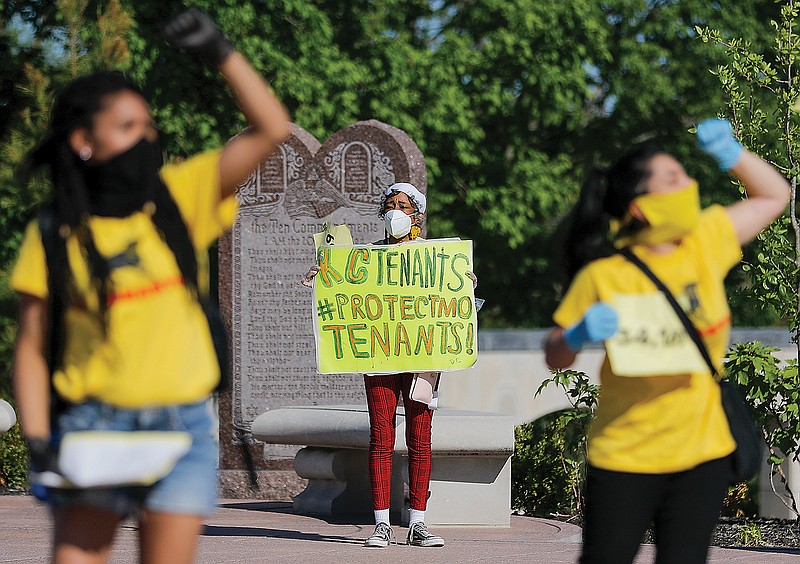Ahead of Missouri's planned reopening Monday, labor and housing advocates said Thursday that the state and Gov. Mike Parson specifically are not doing enough to protect workers and families.
Union leaders, members of the Missouri House of Representatives, a Missouri state senator, and other labor and economic justice advocates called upon Parson on Thursday morning to provide financial assistance to state workers for transitioning to telework, and to provide state workers with what they deemed to be more adequate personal protective equipment, or PPE.
The workers advocates spoke of included social workers, Missouri Department of Corrections staff who interact with offenders, Missouri Department of Social Services' Division of Youth Services staff, and employees in Missouri Department of Mental Health facilities and veterans' homes.
The state is offering $250 of hazard pay per pay period to workers in residential facilities such as prisons and psychiatric hospitals where there's been a case of COVID-19 among staff or wards of the state, but the hazard pay is limited to workers who don't miss a day on the job - an incentive to keep state workers at such facilities from not showing up for work once a case is confirmed.
Rep. Keri Ingle, D-Lee's Summit, said the state should offer essential or premium pay regardless of whether a worker misses a day. Otherwise, Ingle said the practice incentivises workers to come in who may be sick.
Nimrod Chapel, Jr., president of the Missouri NAACP, said PPE and free testing should be distributed to state employees before their return to work.
More specifically, advocates are seeking N95 respirator masks for state employees - not cloth or other homemade masks.
Danny Homan, president of American Federation of State, County and Municipal Employees Council 61, said "quit calling a stupid cloth mask personal protective equipment; it is not effective."
The Centers for Disease Control and Prevention recommends people wear cloth face coverings in public settings where social distancing is difficult, but it is true cloth face coverings do more to prevent a person who does not know they are infected with a respiratory disease from infecting others, rather than protecting an uninfected wearer.
"The cloth face coverings recommended are not surgical masks or N95 respirators. Those are critical supplies that must continue to be reserved for health care workers and other medical first responders, as recommended by current CDC guidance," according to the CDC.
Likewise, Parson's administration has focused on providing N95 masks and other PPE to health care providers and first responders - spending tens of millions of dollars to do so.
"We have the masks," but they're not being distributed to everyone, said Tim Cutt, association representative of the Missouri Corrections Officers Association.
"What we've outlined is the compromise," said Natashia Pickens, president of Communications Workers of America Local 6355 - nothing less than PPE for everyone.
Parson later on Thursday said, when asked if there's a plan to get PPE to more workers beyond health care providers and first responders, that businesses and state departments will turn to the private sector to get PPE.
"As we move forward, PPE gear is becoming more and more available," he said.
"If we need to do anything to protect our employees in the state, we're going to protect our employees in the state. If it's a matter of supplying PPE, if we think that's the direction to go in, we'll make sure to provide that."
Labor advocates were not the only group that asked of more from Parson on Thursday.
A group of about three dozen protesters from the Coalition to Protect MO Tenants were outside the Capitol in the afternoon, demanding Parson call for an immediate suspension on rent and mortgages, place a moratorium on evictions and foreclosures, ban utility shut-offs and mandate universal service, as well as expand housing and services for people experiencing homelessness.
The group had previously issued the demands, and earlier in April, they protested along Interstate 70.
While Parson did not directly address the group in his afternoon briefing at the Capitol about an hour before the protest outside, he did outline federal aid and other resources to be available for cities and counties to assist families experiencing housing issues because of the economic effects of the pandemic.
Parson said under the Coronavirus Aid, Relief and Economic Security Act, or CARES Act, 15 of the state's largest cities and counties will receive $24 million in assistance such as community development block grants to help provide services such as food, clothing, housing and utilities on the behalf of individuals or families.
Missouri will also receive $9.4 million of Emergency Solution Grant funding to help unsheltered and sheltered homeless people, as well as people at risk of homelessness. The funds can be used for eviction prevention assistance, including rapid re-housing, housing counseling and rental deposit assistance, Parson said.
"We anticipate federal guidance on these funds in the next few weeks," he said.
Parson added, since March 18, there's been a moratorium on foreclosures of federally-backed mortgages, in place for 60 days, with a 180-day extension available to mortgage holders with financial hardship because of the pandemic.
He said the state has also worked with investor-owned utility companies to stop disconnects and shut-offs related to the pandemic, and the Missouri Housing Development Corporation is working on guidance to provide an additional $9 million in rent assistance to individuals and families experiencing economic hardship because of the pandemic.
While Parson said the Missouri Supreme Court and several judicial circuits have suspended or postponed eviction and foreclosure proceedings until May 15, protesters decried the use of remote hearings for those kinds of proceedings.

